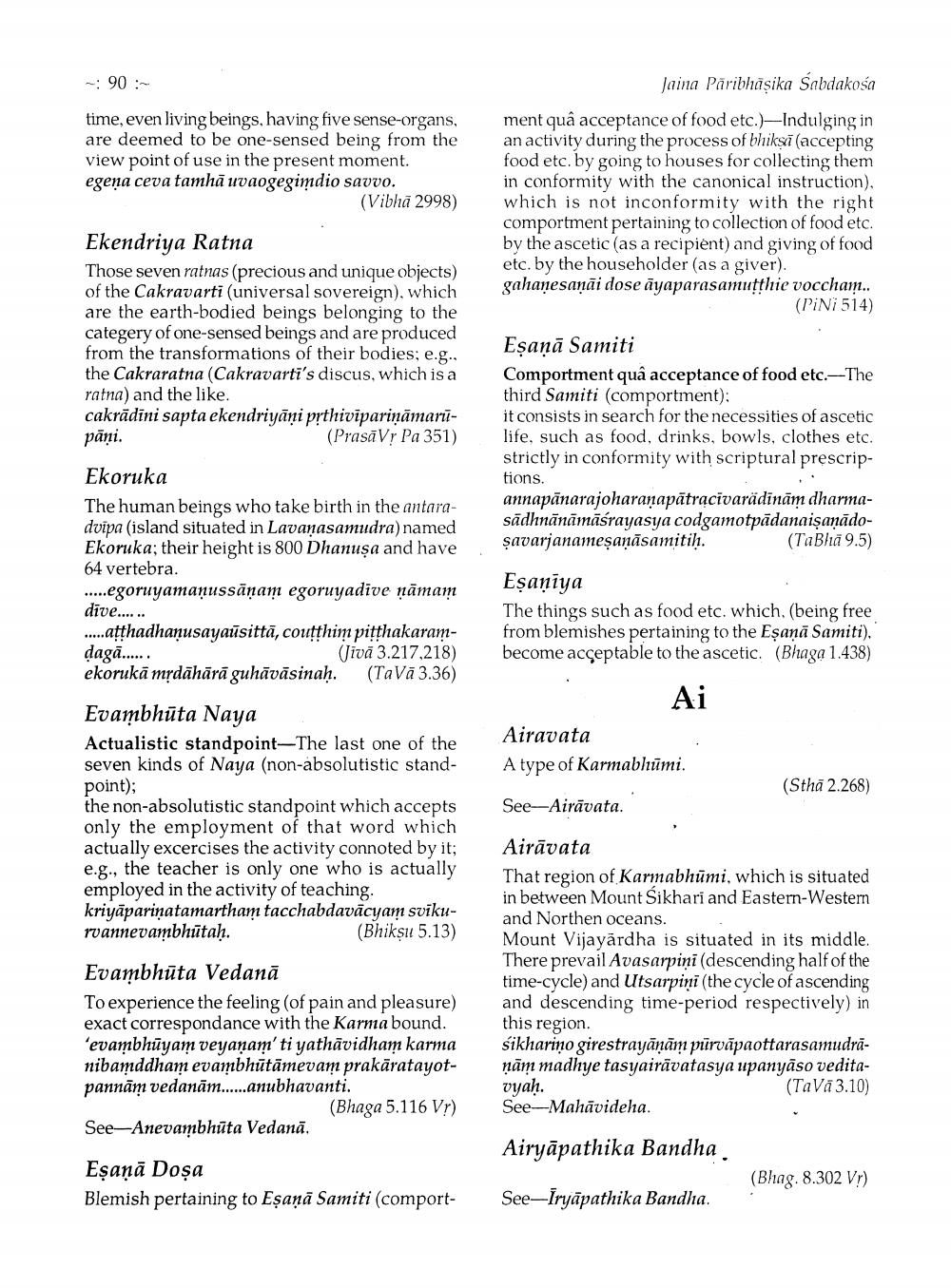________________
- 90 :
time, even living beings, having five sense-organs, are deemed to be one-sensed being from the view point of use in the present moment. egeņa ceva tamhā uvaogegimdio savvo.
(Vibhā 2998)
Jaina Păribhāşika Sabdakosa ment quâ acceptance of food etc.)-Indulging in an activity during the process of bhikṣi (accepting food etc. by going to houses for collecting them in conformity with the canonical instruction), which is not inconformity with the right comportment pertaining to collection of food etc. by the ascetic (as a recipient) and giving of food etc. by the householder (as a giver). gahanesanāi dose āyaparasamutthie voccham..
(PiNi 514)
Ekendriya Ratna Those seven ratnas (precious and unique objects) of the Cakravarti (universal sovereign), which are the earth-bodied beings belonging to the categery of one-sensed beings and are produced from the transformations of their bodies; e.g.. the Cakraratna (Cakravarti's discus, which is a ratna) and the like. cakrādini sapta ekendriyāni prthivipariņāmarupāņi.
(PrasāVPa 351)
Eşaņā Samiti Comportment quâ acceptance of food etc.--The third Samiti (comportment); it consists in search for the necessities of ascetic life, such as food, drinks, bowls, clothes etc. strictly in conformity with scriptural prescriptions. annapānarajoharanapātracivarädinām dharmasādhnānāmāsrayasya codgamotpādana işaņādoşavarjanameşaņāsamitiḥ. (Tabha 9.5)
Ekoruka The human beings who take birth in the antaradvipa (island situated in Lavanasamudra) named Ekoruka; their height is 800 Dhanusa and have 64 vertebra. .....egoruyamanussāņam egoruyadive ņāmam dive...... ...atậhadhaņusayaūsittā, coutthimpitthakaramdagā......
(Jivā 3.217,218) ekorukā mýdāhārā guhāvāsinaḥ. (Tavā 3.36)
Eşaniya The things such as food etc. which, (being free from blemishes pertaining to the Eşaņā Samiti). become acceptable to the ascetic. (Bhaga 1.438)
Ai
Airavata A type of Karmabhūmi.
(Sthā 2.268)
See-Airāvata.
Evambhūta Naya Actualistic standpoint-The last one of the seven kinds of Naya (non-absolutistic standpoint); the non-absolutistic standpoint which accepts only the employment of that word which actually excercises the activity connoted by it; e.g., the teacher is only one who is actually employed in the activity of teaching. kriyāparinatamartham tacchabdavācyam svikurannevambhūtaḥ.
(Bhiksu 5.13)
Eoambhuta Vedanữ To experience the feeling (of pain and pleasure) exact correspondance with the Karnia bound. 'evambhūyam veyanam' ti yathāvidham karma nibamddham evambhūtāmevam prakāratayotpannām vedanām......anubhavanti.
(Bhaga 5.116 Vr) See-Anevambhūta Vedanā.
Airāvata That region of Karmabhūmi, which is situated in between Mount Sikhari and Eastern-Western and Northen oceans. Mount Vijayārdha is situated in its middle. There prevail Avasarpiņi (descending half of the time-cycle) and Utsarpiņi (the cycle of ascending and descending time period respectively) in this region. sikharino girestrayāņām prvāpaottarasamudraņām madhye tasyairāvatasya upanyāso veditavyaḥ
(Tavā 3.10) See-Mahāvideha.
Airyāpathika Bandha
Eşaņā Doşa Blemish pertaining to Eşaņā Samiti (comport-
(Bhag. 8.302 Vr)
See-Īryāpathika Bandha.




